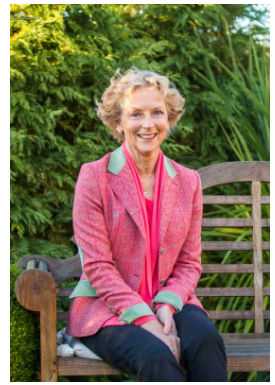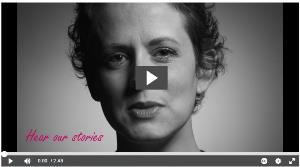The gift of hope - breast cancer research

It is a sad reality that you, or someone you know, is likely to develop breast cancer.
Over 1.6 million women worldwide are diagnosed each year and although huge strides have been made, over 10,000 women still die from the disease every week.
We are asking for your help to raise £1 million for our world-leading breast cancer research taking place here in Nottingham and Derby - and why we’ve made breast cancer the focus for this year’s Life Cycle 6 fundraising challenge
Sue's story
|
“I’d had non-cancerous cysts in my breasts since my late twenties and no family history of breast cancer, so being diagnosed in 2011, just five months after a supposedly clear mammogram, came as a huge shock. My treatment began with chemotherapy. I lost my hair and after my third dose of chemo suffered from hand-foot syndrome – my hands looked like they had been dipped in boiling oil and I couldn’t even wash or dress myself.
After chemo I had a mastectomy. I remember standing in front of the surgeon, bald, wearing hospital knickers, and feeling vulnerable. Surgery was one of the most difficult things for me, but deciding to donate my right breast to the Breast Cancer Now Tissue Bank at Nottingham felt like a really positive thing to do and it was nice to know I was helping progress research in some small way.
Three weeks of radiotherapy followed, then a year of three-weekly intravenous Herceptin, and reconstructive surgery. It was tough – I was emotionally and physically fragile at times but I’m a believer in getting on with life. As I got stronger I started charity fundraising and met some amazing people, which helped enormously. I’m now passionate about supporting breast cancer research. We need to be able to identify those at risk as early as possible and if cancer does develop, stop it spreading.
Tests have shown that I am in the higher risk category for long-term recurrence, so the cancer could return at some point. If it does, I need to know there will be something out there to help me. I know I’m one of the lucky ones – I’ve been given more time and I’m determined to use it to make a difference.”
Hear more of Sue's story at #BreastCancerandMe
|
Sue Stannard is one of the women supporting our research

|
Watch our campaign video
Hear our stories 
|
Sue - along with fellow breast cancer patients Lisa, Leanne and Caroline - are at the heart of our campaign.
At different stages in their breast cancer journeys, they give us an insight into what it's like to live with breast cancer – from diagnosis to looking to the future and what our research at Nottingham and Derby means to them. Real women. Real stories. Real hope.
|
What we are doing - our breast cancer research

Detecting breast cancer early
By identifying the antibodies produced in response to the first cancer cells, Nottingham’s Professor John Robertson and team aim to develop the world’s first blood test to detect early breast cancer in women of all ages.
The test can also be used to identify those women at highest risk, meaning effective preventative drugs can be given early – potentially preventing 35% of all breast cancers.
The team has already developed the world’s first blood test to detect early lung cancer, which is saving lives in the USA and undergoing a clinical trial in Scotland.
Thanks to generous gifts, we have started to extend this work to other cancers. With your support, we can make the world’s first blood test for breast cancer a reality.
More about this research

Stop it spreading
Breast cancer kills, particularly when it spreads outside the breast and grows around the body – a process called metastasis.
Dr Stewart Martin and colleagues including world-leading researcher Professor Ian Ellis, are investigating how to stop this process in its tracks.
Crowned 2013 Breast Cancer Campaign Research Team of the Year,they discovered that breast cancer cells use the lymphatic system to spread, and have pinpointed particular proteins that are linked to this process. They are now using this insight to help improve the effectiveness of treatments including testing novel drugs developed here in Nottingham.
Charitable donations have made this exciting research possible, including funding the Breast Cancer Now Tissue Bank which provides the patient specimens our researchers need.
More about this research

Treat it right - developing targeted treatments
There are many different types of breast cancer. Treatments that specifically target each type of cancer cell create fewer side effects than conventional chemotherapy and can be used for longer.
In older patients, hormone-dependent cancers are the most common. Professor Robertson has led the introduction of the most recent of the anti-hormone therapies approved for use worldwide. Yet over time, tumours can develop resistance to treatments so we are researching new drugs.
'Triple Negative Breast Cancer’ is an aggressive form for which no targeted treatment currently exists. Dr Madhusudan and team have identified a weakness in the way these cancerous cells survive and multiply. They now want to develop drugs which exploit this weakness with the aim of either killing the cells or making them more vulnerable to chemotherapy and radiotherapy.
More about this research
Join us for Life Cycle 6 and help us raise £1 million for this breast cancer research. There are lots of great ways to get involved:
Give a gift today
100% of every penny donated will go direct to our research laboratories
Make a donation
Thank you for everything you do
Thank you to all those who have supported our work into cancer early detection so far. If you can, please do continue to support this life-changing research.
Together, we can help to save lives.

Posted on Wednesday 16th March 2016